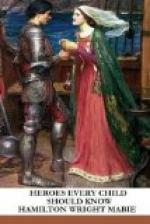When the Scottish army was drawn up, the line stretched north and south. On the south, it was terminated by the banks of the brook called Bannockburn, which are so rocky, that no troops could attack them there. On the left, the Scottish line extended near to the town of Stirling. Bruce reviewed his troops very carefully. He then spoke to the soldiers, and expressed his determination to gain the victory, or to lose his life on the field of battle. He desired that all those who did not propose to fight to the last, should leave the field before the battle began, and that none should remain except those who were determined to take the issue of victory or death, as God should send it. When the main body of his army was thus placed in order, the King dispatched James of Douglas, and Sir Robert Keith, the Mareschal of the Scottish army, in order that they might survey the English force. They returned with information, that the approach of that vast host was one of the most beautiful and terrible sights which could be seen—that the whole country seemed covered with men-at-arms on horse and foot.
It was upon the twenty-third of June, 1314, the King of Scotland heard the news, that the English army was approaching Stirling. The van now came in sight, and a number of their bravest knights drew near to see what the Scots were doing. They saw King Robert dressed in his armour, and distinguished by a gold crown, which he wore over his helmet. He was not mounted on his great war-horse, because he did not expect to fight that evening. But he rode on a little pony up and down the ranks of his army, putting his men in order, and carried in his hand a sort of battle-axe made of steel. When the King saw the English horsemen draw near, he advanced a little before his own men, that he might look at them more nearly.
There was a knight among the English, called Sir Henry de Bohun, who thought this would be a good opportunity to gain great fame to himself, and put an end to the war, by killing King Robert. The King being poorly mounted, and having no lance, Bohun galloped on him suddenly and furiously, thinking, with his long spear, and his tall, powerful horse, easily to bear him down to the ground. King Robert saw him, and permitted him to come very near, then suddenly turned his pony a little to one side, so that Sir Henry missed him with the lance-point, and was in the act of being carried past him by the career of his horse. But as he passed, King Robert rose up in his stirrups, and struck Sir Henry on the head with his battle-axe so terrible a blow, that it broke to pieces his iron helmet as if it had been a nut-shell, and hurled him from his saddle. He was dead before he reached the ground. This gallant action was blamed by the Scottish leaders, who thought Bruce ought not to have exposed himself to so much danger, when the safety of the whole army depended on him. The King only kept looking at his weapon, which was injured by the force of the blow, and said, “I have broken my good battle-axe.”




